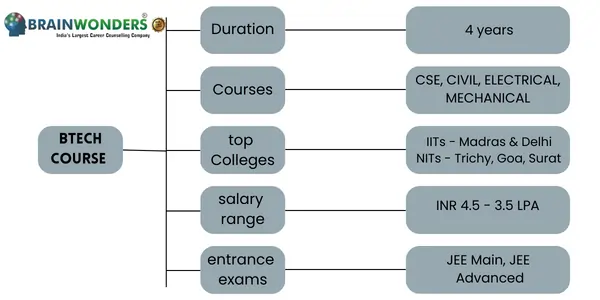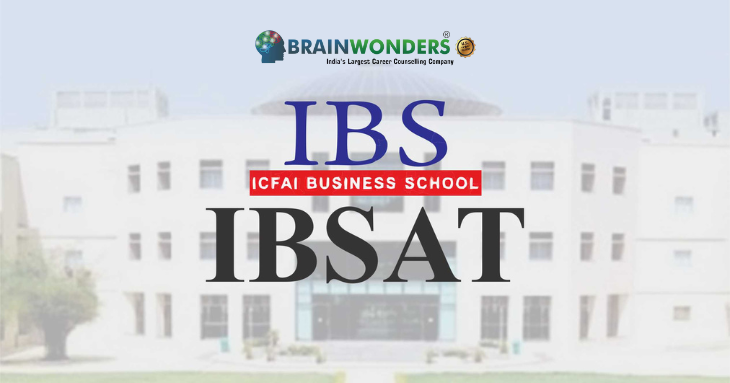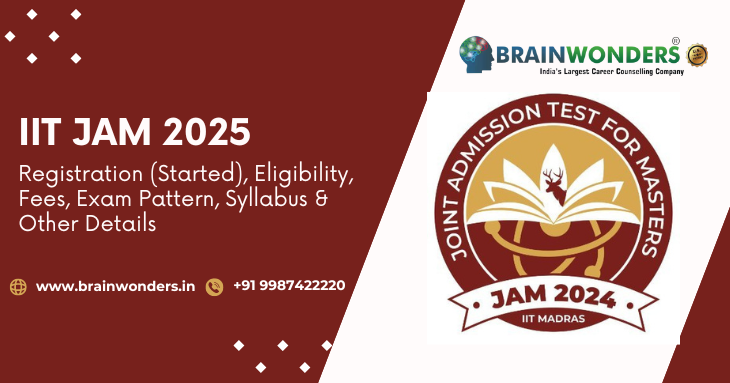

Get your U.S. Patented DMIT analysis and lead the way to a happy and successful career
Worry not, because the Brainwonders test and guidance will not only help you know it, but also follow it!
Blog
05 February,2024 | By Brainwonders

The full form of BTech is Bachelor of Technology (BTech). BTech is a prestigious undergraduate engineering degree that offers diverse and rewarding career opportunities in the rapidly evolving technological landscape. India produces over 10 lakh engineering graduates annually, with engineering education comprising approximately 2,500 engineering colleges and 1,300 polytechnic colleges.
BTech courses span a broad spectrum of engineering disciplines, from traditional fields like civil and mechanical engineering to emerging domains like artificial intelligence and robotics. To gain admission to BTech courses, students typically take entrance examinations such as JEE Main and JEE Advanced, along with state and private-level entrance examinations.
The basic eligibility criteria for BTech is Class 12 with Physics, Chemistry, and Mathematics. However, additional criteria may apply in each entrance exam and institute. Some institutes also admit students based on their class 12 board exam scores.
Renowned institutions like the Indian Institutes of Technology (IITs) and National Institutes of Technology (NITs) are the pinnacle of engineering education in India, attracting the brightest minds with their rigorous academic programs and industry-aligned curricula. BTech courses emphasize theoretical knowledge, practical exposure, and industry-relevant skills, preparing graduates to excel in their chosen fields and tackle complex technical challenges.
The BTech program spans eight semesters, and here are key highlights of the course, including its structure, academic level, examination format, average starting salary, prominent recruiters, and sought-after job profiles:

Here are some key highlights of the BTech course, including its structure, level, examination type, average starting salary, top recruiters, and prominent job profiles:
| Particulars | Details |
| Course Level | Undergraduate |
| Course Name | Bachelor of Technology |
| Course Duration | 4 years |
| Examination Type | Semester-wise |
| Course fee | INR 5- 9 lakh |
| Top Colleges | IIT Bombay, IIT Delhi, DTU, Jadavpur University, Jamia Millia Islamia |
| Average Salary | INR 4 - 10 LPA |
| Job Scope | Chemical Engineer, Mechanical Engineer, Computer Science Engineer, Research Associate, Professor |
| Entrance Exam | JEE Main, JEE Advanced, WBJEE, KEAM, AP EAMCET, TS EAMCET |
| Top Recruiters | Google, Apple, Hindustan Unilever Ltd, ISRO, |
| Specialisations | Civil Engineering, Mechanical Engineering, Computer Engineering, Electrical Engineering, Marine Engineering |
BTech full form is Bachelor of Technology, an undergraduate four-year course offered in various disciplines and specialisations. The BTech experience in India is distinguished by its focus on theoretical understanding, practical exposure, and the development of industry-relevant skills. Students undergo intensive coursework, participate in hands-on laboratory sessions, and engage in real-world projects, acquiring a well-rounded comprehension of engineering principles and their practical implementations. This comprehensive approach readies BTech graduates to excel in their chosen domains, arming them with the expertise needed to address intricate technical challenges and make substantial contributions to technological progress.
While each of these specialisations provides promising opportunities for students to pursue diverse career paths, Computer Science Engineering stands out as one of the most sought-after courses in the present day. This is evident in the elevated cut-off exam scores required by leading engineering institutions, including the Indian Institutes of Technology (IITs), the Indian Institute of Information Technology (IIITs), the National Institutes of Technology (NITs), and some premier central universities. These institutions demand high entrance exam scores from applicants to admit them into the Computer Science Engineering program.
The Bachelor in Engineering (BE) degree course offers similar orientation to its students as a BTech course would offer. The students' eligibility criteria to colleges, subjects of study, recruiting companies and placement job profiles are so similar that students often question if these two candidates are the same. The main difference between the two degree programs is the content and style of the program. The table below identifies the principal distinctions between the two courses.
| BE | BTech |
| BE is more theoretical and knowledge-oriented. It is a study based on theory. | BTech is skill/data-oriented. The course is more of application engineering. |
| The course deals with engineering aspects of Science. | The course deals with the technical aspects of Science. |
| The course is applied to develop innovative equipment and useful technical gadgets in Science and Technology. | The course applies the principles of engineering and technology to modify structures and thereby enhance their quality. |
The basic eligibility requirement for admission to any BTech course is:
Admission Process for BTech
All the BTech course aspirants must follow a similar process for admission to any institute. Various stages for BTech admissions are given below:
In India, regulatory oversight for all technical courses, including BTech, is provided by the All India Council for Technical Education (AICTE) and the National Board of Accreditation (NBA). Admission to BTech courses is facilitated through various engineering entrance examinations at national, state, or institute levels. The primary engineering entrance exams widely taken by a significant number of students each year include:
| Exam | Exam Dates |
| JEE Main |
JEE Main 2025 Exam Date
|
| JEE Advance | Expected Date: May/June 2025 |
| MHTCET | PCM Group: March 19–April 27, 2025 and PCB Group: April 9–17, 2025 |
| CUET | May 2025 (Exact dates to be announced) |
| TS EAMCET | April 22, 2025 (Engineering stream) |
| BITSAT | Session 1: May 26–30, 2025 and Session 2: June 22–26, 2025 |
| COMEDK UGET | May 10, 2025 |
| KCET | April 16–17, 2025 (Engineering) and Kannada Language Test: April 15, 2025 |
| KEAM | Engineering: April 23, 25–29, 2025 and Pharmacy: April 24 & 29, 2025 |
| WBJEE | April 27, 2025 |
| VITEEE | April 20–27, 2025 |
BTech degrees are offered in various specializations that are all quite popular with students within India. The current need in the industry emphasizes the importance of professionals with these skills and knowledge bases. Computer Science Engineering, Mechanical Engineering, and Civil Engineering are still the most popular specializations. New research areas are also popularizing branches like Aerospace Engineering, Marine Engineering, and Petroleum Engineering. Other popular specializations include:
| BTech Specialisations | |
| Computer Science Engineering | Mechanical Engineering |
| Aerospace Engineering | Civil Engineering |
| Ceramic Engineering | Electronics & Communication Engineering |
| Metallurgical Engineering | Petroleum Engineering |
| Electrical Engineering | Marine Engineering |
| Chemical Engineering | Electronics & Electrical Engineering |
According to NIRF rankings, the top government institutes include IITs and NITs. These institutions offer many undergraduate, postgraduate, and doctoral programs for a wide range of Engineering specializations. The use of world-class standards, they all continuously rank in the top of the rankings for engineering colleges in India. Note that the colleges in the table below are presented in an ordered list only in alphabetical order and not in ranked order. Below is a list of Colleges that offer UG, PG, and PhD programs in various Engineering specializations.
| Institute | Tuition Fees |
| Delhi Technological University | INR 2- 6 lakh |
| Institute of Chemical Technology, Mumbai | INR 83,000 - 3 lakh |
| IIT Dhanbad (ISM) | INR 90,000 - 8 lakh |
| IIT Indore | INR 2 - 8 lakh |
| IIT Mandi | INR 20,000 - 10 lakh |
| IIT Ropar | INR 27,000 - 9 lakh |
| Jamia Millia Islamia | INR 27,000 - 1 lakh |
| NIT Silchar | INR 1 - 5 lakh |
| NIT Surathkal | INR 1 - 5 lakh |
| VNIT Nagpur | INR 1 - 5 lakh |
After finishing your Bachelor of Technology (BTech) program, students have myriad options. BTech career opportunities vary diplomatically, depending on your specialization, personal preferences, and skill set.
CONCLUSION
Brainwonders is the top career counseling center known for its creative and accurate guidance processes. For students who aren't sure what to do after they finish 12th grade, Brainwonders can help with a career counseling session that may ultimately change their lives. Brainwonders is able to advise students by using the Dermatoglyphics Multiple Intelligence Test (DMIT) to help students learn their multiple intelligence areas, personality traits, and learning styles. Once students' career choices align with their innate natural talents, students will be happier in their lives, and have room for potential growth throughout their career. Brainwonders is a dependable partner in students' and parents' lives as they go through this process, tracking their decisions, discovering their potential, and achieving career goals. Brainwonders is known as a safe place to get trusted advice about careers, and found a strong source of expertise in the use of the Dermatoglyphics Multiple Intelligence Test. Brainwonders will use the DMIT test and effective advice will come from a team of trained professionals. Brainwonders fosters a holistic approach to a student's exploration of career interests for some or all of their career guidance overview - they cover career counseling, educational planning, and skill planning or forecasting for students.
Q. What can I do with a Bachelor of Technology or BTech?
Ans: Upon obtaining a BTech degree, individuals can embark on diverse career paths, including roles as a Software Developer, Information Technology Consultant, Computer Forensic Analyst, Information Technology Business Analyst, and Computer Network Architect. Furthermore, post-BTech, candidates can pursue an MTech for specialised expertise within a specific sub-branch of their primary discipline. This can lead to opportunities in research or academia, with the potential for further advancement through a PhD. The dynamic nature of the BTech course also attracts graduates to consider pursuing an MBA, a popular choice, especially among those with a few years of professional experience.
Q. What is the full form of BTech? What is the duration of the course?
Ans: BTech full form is Bachelor of Technology, an undergraduate engineering degree awarded to a candidate. The duration of this degree course is four years. Candidates who pursue BTech in Lateral Entry can complete this course in three years. Lateral Entry BTech is offered to candidates after they have completed the Diploma course, and they can enter into the BTech programme straight into the second year.
Q. Should I take NIT with a lower branch or a private college with a CS branch?
Ans: For students aiming for a blend of the prestige associated with NITs and the affordability found in private colleges, the Indian Institutes of Information Technology (IIITs) present an appealing choice. With 26 IIITs situated across the country, aspiring engineers can pursue promising specialisations such as Computer Science (admissible up to JEE Main ranks of 40-45 thousand), Data Science, Electronics and Communication Engineering (ECE) (acceptable up to JEE Main ranks of 55-60 thousand), and Mechatronics/Mechanical (admissible up to JEE Main ranks of 75 thousand).
Moreover, several government-funded technical Institutes (GFTIs) offer high-quality engineering education and placement opportunities comparable to those in many private colleges. These institutions include Jawaharlal Nehru University (JNU), Hyderabad University, IIIT Bhubaneswar, IIIT Naya Raipur, and Pondicherry Engineering College.
For those specifically interested in Computer Science, leading private institutes such as Thapar University, LNMIIT, JIIT, JSS, and RVCE provide excellent programs. However, admission to these institutions typically requires high JEE Main ranks.
Q. What is the best career option after BTech in CSE?
Ans: BTech graduates primarily find employment in technical roles. Individuals who have completed a BTech degree are eligible for positions across various sectors in India, including roles as consultants, subject matter experts, researchers, managers, and more. In the contemporary landscape, a favourable career path for BTech graduates, particularly in Computer Science Engineering (CSE), involves opportunities as analysts or data scientists in leading multinational or IT companies. The expanding global use of data also opens up substantial prospects for research in the field of CSE, providing a significant avenue for career growth.
Q. What is the scope of BTech in Information Technology?
Ans: A BTech in Information Technology is emphasised in computers and technology. It distinguishes itself from Computer Science engineering by incorporating management and information theory elements into the curriculum. The program entails a comprehensive exploration of programming and computer software. Individuals pursuing a BTech in IT have the option to further their education with an advanced degree in Artificial Intelligence or Machine Learning, paving the way for employment in leading IT companies that seek expertise in data mining.
Get your U.S. Patented DMIT analysis and lead the way to a happy and successful career



,_Syllabus,_Pattern,_Old_Question_Papers.png)

